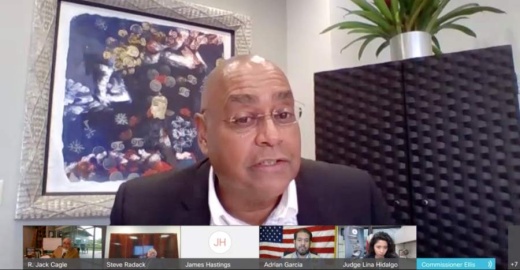In a 3-2 vote, Harris County commissioners approved an initial injection of $15 million into the fund at an April 28 Commissioners Court meeting. That money will be used to help poor families, undocumented residents and other targeted populations pay for rent, utilities and other needs, said Precinct 1 Commissioner Rodney Ellis, who proposed the idea.
The fund will be managed by the Greater Houston Community Foundation and United Way. The foundation will manage the money for an administrative fee of 7% and will be tasked with identifying grantees, Ellis said.
"My intent was to try to set it up in such a way that we can get some immediate relief, particularly in the area of rental assistance and utility assistance," Ellis said. "Hopefully, we can get reimbursed, but if we can’t, there are just some people out there who need help who contribute to this economy. ... They will fall through the cracks."
After discussing how the county would move forward with $426 million federal relief dollars from the Coronavirus Aid, Relief and Economic Security Act, Ellis said he wanted to make sure relief funding was disbursed with an "equity lens" to ensure no one is overlooked in the recovery effort.
Because federal relief often has strict requirements for how it can be spent, Ellis said some residents did not receive stimulus checks or are not eligible for relief from the federal funding.
To be eligible for the funding in the newly created Harris County program, an individual must be a resident of the county and must be living in a household making below 70% of the federal Area Median Income. Individuals are also eligible if they qualify for a number of federal assistance programs, including the Supplemental Nutrition Assistance Program, Medicaid or the National School Lunch Program. Domestic violence survivors and foster children who have aged out of the system are also eligible.
Other major cities in Texas, including Austin, Dallas and San Antonio, have already created similar funds. In a unanimous vote, Austin City Council put $15 million into its fund earlier this month.
The official establishment of the fund in Harris County is pending a legal review by the county attorney's office. Robert Soard, first assistant in the attorney's office, said he will be reaching out to the city of Austin for details on the legality of using property tax dollars for such a fund.
This $15 million injection was opposed by Precinct 3 Commissioner Steve Radack and Precinct 4 Commissioner Jack Cagle. Cagle said he would be OK with the program if it was funded through donations or federal dollars but balked at the idea of using county taxpayer dollars.
The funding will be taken from the county's Public Improvement Contingency Fund, also known as the rainy day fund, which sat at about $260 million as of April 28, according to Chief Budget Officer Bill Jackson.
"We may have a long, hard winter ahead of us, and we need to be very, very careful what we do with regard to our property tax funds where we may or may not be able to help everybody we want to," Cagle said. "If we have to raise our taxes, which I am not in favor of, we will hurt those right now who are hurting the most."
Several public speakers called into the meeting to express their support, including representatives with groups that work with immigrants and people who said they would directly benefit from such a fund.
Daniel Stoker, president and CEO of The Alliance, a Houston-based group that works with refugees and immigrants, said the needs among those groups, including needs for food and rental assistance, are growing by the day.
"For a community to persevere through hardship, all segments of society with needs must have access to emergency recovery resources," Stoker said. "We all suffer and stumble with recovery if population segments are left suffering."
Commissioners also discussed how to plan the disbursement of $426 million in federal relief money, which could possibly include programs to provide rent assistance, funding for food banks, helping small businesses and a number of other programs.
Jackson said it can be used for a wide variety of virus-related programs, though he said he expects more clear guidelines to eventually come from the U.S. Department of the Treasury.
In the meantime, county officials have formed a committee to start the process of figuring out how to spend the money and what should be prioritized with the understanding that $426 million is likely not going to be enough to cover all needs. The committee will include one representative chosen by each Commissioners Court member, and Jackson said he also plans to work with the county attorney's and auditor's offices to clarify the intent of the law.
"We should budget every dime of it," Jackson said. "I think you can do it within the guidelines that you have."
The funding has to be spent by the end of the 2020 calendar year, per U.S. Treasury guidelines.
One thing the funding cannot be used to cover is filling in gaps from lost revenue, such as sales tax revenue or toll road revenue, Jackson said.
"This year, we don’t anticipate a great amount of lost revenues because we're about 80% property tax," he said. "That’s what puts us in a different situation from a lot of local governments."
The committee will engage Guidehouse, a consulting company, on developing a plan for the funding. The county also used Guidehouse to develop a strategy for implementing disaster relief funding after Hurricane Harvey in 2017.
Harris County Judge Lina Hidalgo said the group should come back with a proposal in at most two weeks.





